When Catherine and Kieran Roseblade advertised their first “pork boxes” for sale this summer, they thought they would surely have enough left over for their own freezer.
But it did not exactly work out that way.
“We got a pack of rashers and a pack of sausages for ourselves!” laughs Kieran of what they salvaged, such was the demand for their slow-grown, rare-breed, free-range pork.
And indeed, with a waiting list for their next batch of Ruaircs Farm pork boxes, the couple are hoping to translate their passion for pigs into a viable future on their 10ac farm near Tuam in Co Galway.
The farm had been in Catherine’s family for many years before being passed to her parents; but she actually grew up in Monaghan and after school, moved to Scotland, where she studied outdoor education and taught rock climbing and kayaking.#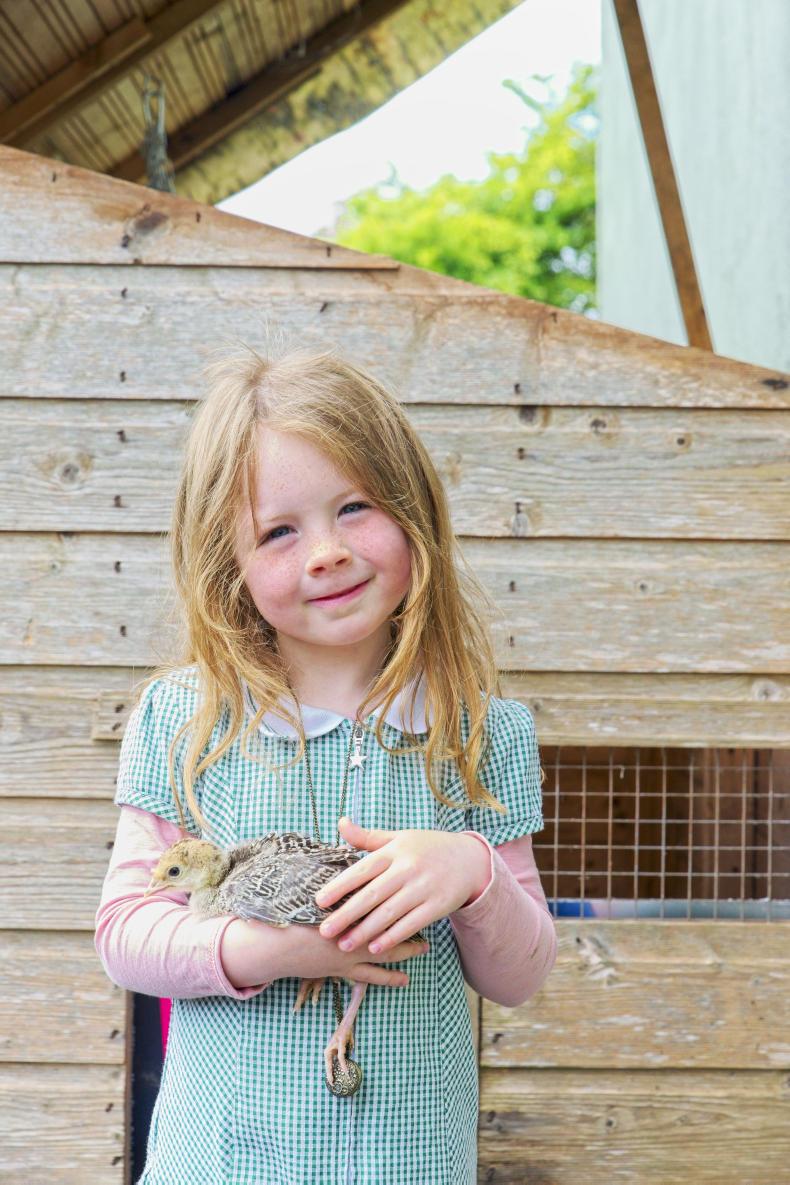
Catherine and Kieran's daughter Ellie pictured on the farm near Tuam. \ David Ruffles
She was working in the US when she met Kieran, a “city kid” from near Wolverhampton in the UK, who also was involved in outdoor pursuits. In 2011, however, the couple decided to settle down, and with the farmhouse vacant in Galway, went west, with Catherine re-training in childcare and Kieran working in building maintenance.
Becoming farmers was not originally part of their plan, though Catherine explains that they did want to become more self-sufficient; at first, keeping a couple of chickens, before starting a small flock of sheep.
As neither of them had grown up on a farm, they were mostly self-taught through YouTube and Facebook, though credit their neighbours for help with issues like “troublesome lambing”, as well as organisations like the Mayo Organic Group.
And as their small farm grew, so did their family, with daughter Ellie (now five) followed by Taisce (18 months). Eager to strike a work-life balance, the couple started looking at what else they could do with their 10ac, with the “spark” coming after Kieran did a one day pig butchery course. 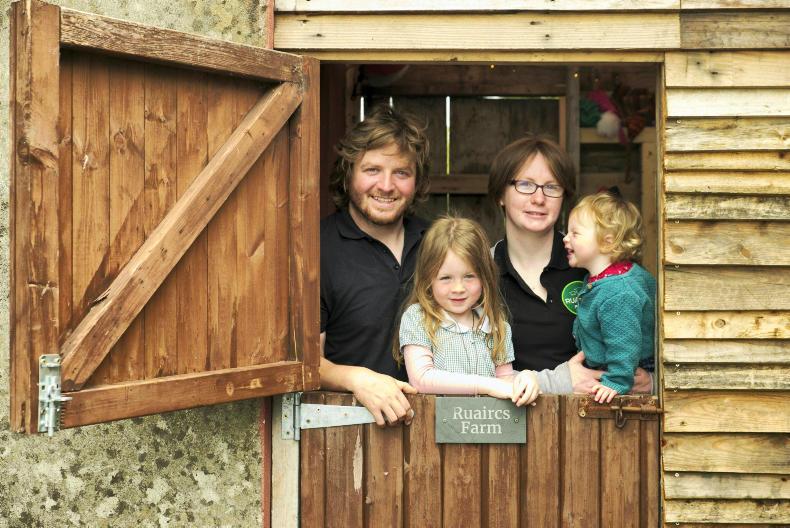
Kieran and Catherine Roseblade with their daughters Ellie (aged 5) and Taisce (aged 18 months) owners of Ruaircs Farm. \ David Ruffles
“It started making us think slightly differently about farming, that we didn’t just have to either raise stuff for us or just go and take it to a factory,” he says. “That there could be another side of trying to sell direct to customers.”
Getting started
Starting their research in the old-fashioned way, with a book, by studying the Haynes Pig Manual, the couple decided that they would concentrate on the Oxford Sandy and Black breed.
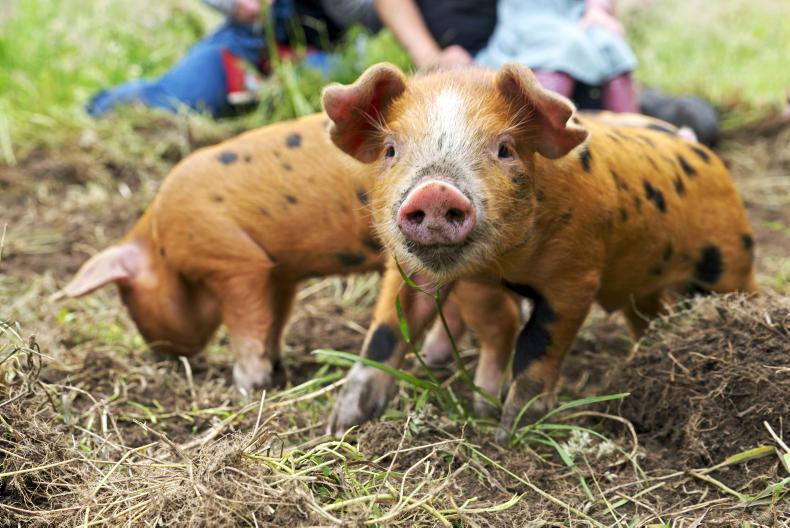
“One of the biggest draws was its temperament,” explains Catherine. “It’s just so calm – with two kids around – so that was a huge draw. It’s a rare breed, it’s slow-grown and it’s fairly light on the land. It does a good bit of grazing, so they were all big draws for us.”
With the help of the Irish Pig Society, they found Dermot Allen of Winetavern Farm in Wicklow, and having received their pig number, purchased their first two weaners from him in May 2019.
“We wanted to do a full cycle first, get them as weaners – which is between eight and 12 weeks – and take them up to their kill weights, get them slaughtered, get it back and then kind of go from there,” says Kieran of the decision to start small.
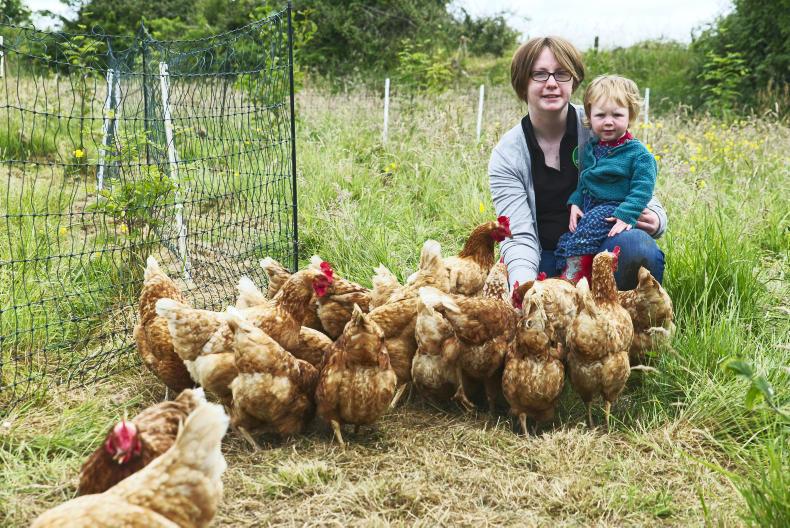
Catherine Roseblade with daughter Taisce and some of their hens. \ David Ruffles
Infrastructure wise, their plan was to rear the pigs outdoors as much as possible, but they also repurposed an old oil tank as a shelter, feeding them mostly on fresh grass, but also organic pig nuts twice a day. And by December, they were ready for the next stage, with Kieran bringing the pigs to Burns’ Meats in Sligo to be slaughtered, butchered and returned in pork boxes.
“That was one of the best decisions we’ve ever made because they are fantastic. I didn’t know what I wanted, how I wanted them killed and they held our hand for the whole thing,” says Kieran.
Pigs to the market
By then, the couple had already bought their next four weaners to rear for meat, followed in January by two purebred pedigree gilts (sows that have not had a litter yet) to work towards breeding their own organic stock. They also decided to start the process of gaining organic certification.
By this stage, Catherine was at home full time, while Kieran was working as a swimming teacher with Water Babies (classes for babies to five year olds) in addition to farming. When lockdown came, however, the couple had time to focus on how they would advertise their pork boxes, opting for a post on Facebook to gauge interest.
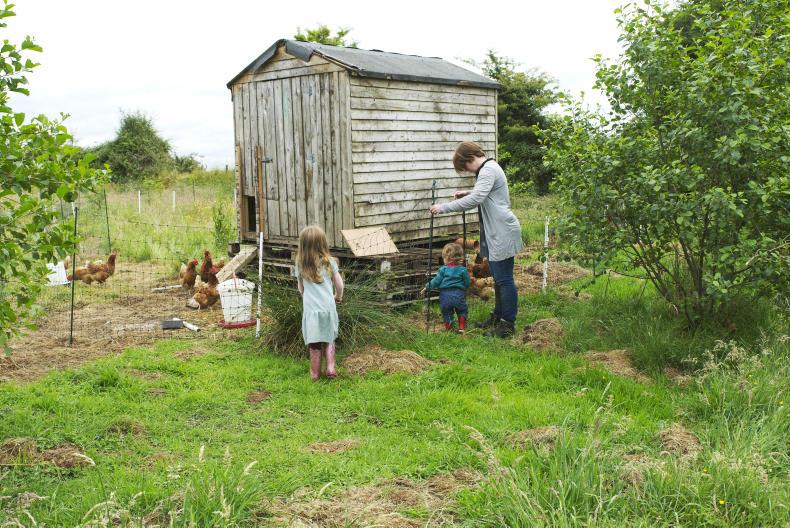
Catherine Roseblade checks on the poultry with daughters Ellie and Taisce. \ David Ruffles
“And within 24 hours we’d sold the number of boxes we thought we’d get from two pigs and we had a waiting list,” says Catherine. “We weren’t expecting it to go down that well.”
From their two pigs, the couple had seven 10kg pork boxes to sell, priced at €150 each. Contents varied slightly per box, but as an example, one contained three packets of sausages, two large packs of rashers, two packs of diced pork, three packs of minced pork, three large roasting joints, a pack of ribs and pieces of pork belly. The remaining two weaners were butchered and sold at the end of June.
Right now, they have another two weaners that they are rearing for meat, plus an in-pig gilt that they bought before she had a litter of five piglets. Sadly, they lost one of their purebred sows during the year, but still have the other and are on the lookout for a boar to breed, with plans to turn an old shed into a farrowing area.
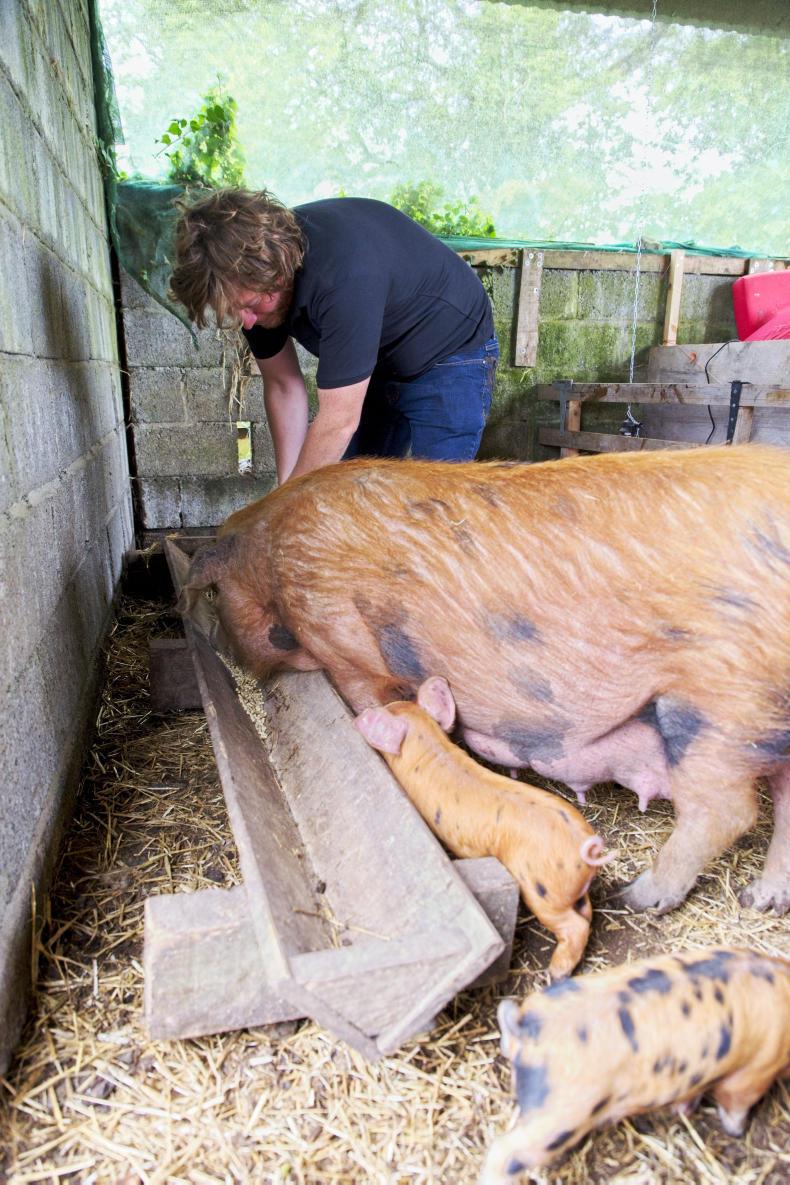
Starting their research in the old-fashioned way by studying the Haynes Pig Manual, the couple decided that they would concentrate on the Oxford Sandy and Black breed. . \ David Ruffles
Rather than build up a lot of stock, they plan to keep numbers small and sell their pork boxes as and when they become available. They estimate that this model should allow them to make a profit of €300 per pig.
As well as this business, Catherine and Kieran sell eggs locally, rear turkeys for the Christmas market and recently bought 50 chickens for meat. They explain that this complements the pigs in two ways; the egg money is a weekly, reliable income, plus it also works with the rotation system on the farm.
“The pigs go around rooting up things, as pigs do, and then the chickens come around and pick through any insects or bugs that are left,” explains Kieran.
Living the dream
When it comes to starting in pig farming, Catherine and Kieran say the biggest challenges are organic feed costs and fencing, as by all accounts, pigs are regular Houdinis when it comes to escaping. On the plus side, they say it’s not expensive to get started (a meat weaner in their breed costs about €70) and that as far as animal husbandry goes, the pigs have plenty of personality and are a joy to work with.
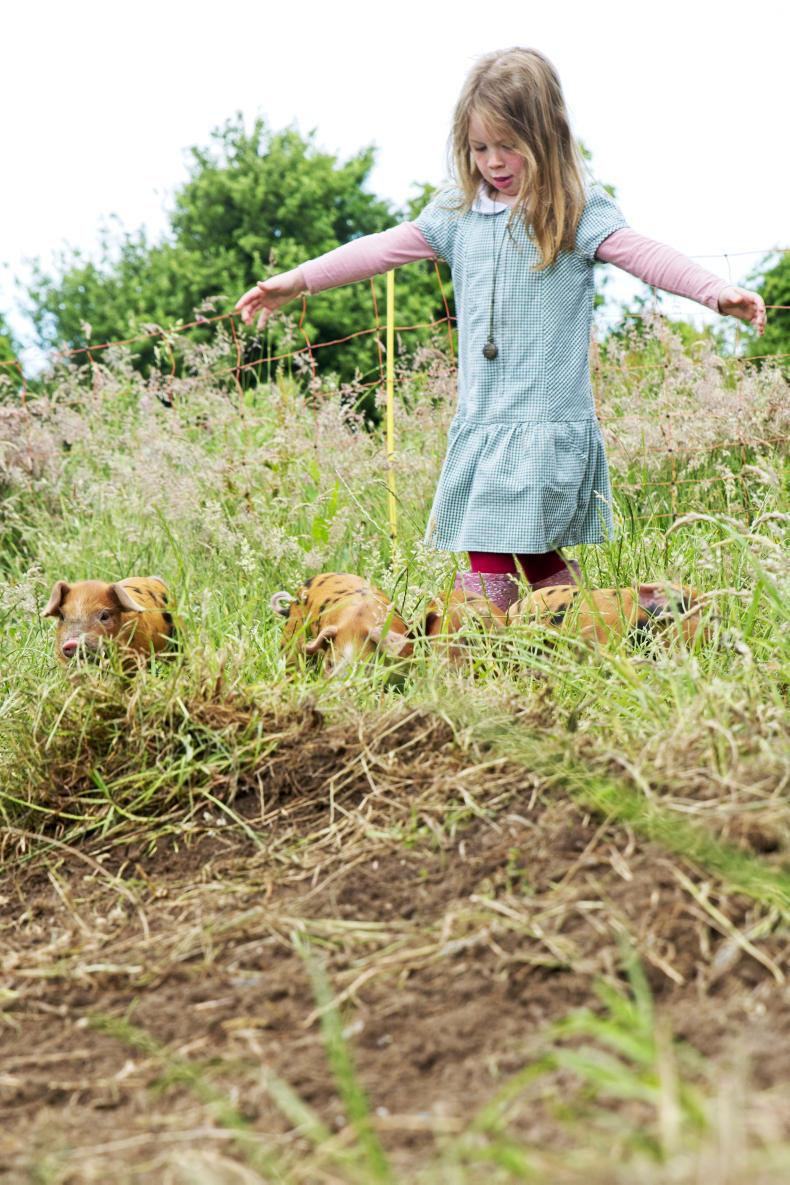
Ellie Roseblade pictured at Ruaircs Farm near Tuam. \ David Ruffles
As newcomers to farming in general, they say that initially “every small step was daunting”, but once they found their passion, they also found their feet. They hope that next year, they will be in the position to both be on the farm full time, and give their daughters the rural upbringing they want for them.
“That’s the dream; and we don’t think that dream is that far off,” says Catherine. “Providing food for us and for other people and bringing in enough money for us to live off and maybe afford the odd luxury.”
And hopefully that will include a few more sausages and rashers for themselves…
For further information or to order, visit www.ruaircsfarm.ie, follow on Facebook and Instagram or email info@ruaircsfarm.ie
Read more
20 minutes with Avril Allshire-Howe, founder of Rosscarbery Recipes
Meet Maurice Allshire of Rosscarbery Biltong: an award-winning producer at 19
When Catherine and Kieran Roseblade advertised their first “pork boxes” for sale this summer, they thought they would surely have enough left over for their own freezer.
But it did not exactly work out that way.
“We got a pack of rashers and a pack of sausages for ourselves!” laughs Kieran of what they salvaged, such was the demand for their slow-grown, rare-breed, free-range pork.
And indeed, with a waiting list for their next batch of Ruaircs Farm pork boxes, the couple are hoping to translate their passion for pigs into a viable future on their 10ac farm near Tuam in Co Galway.
The farm had been in Catherine’s family for many years before being passed to her parents; but she actually grew up in Monaghan and after school, moved to Scotland, where she studied outdoor education and taught rock climbing and kayaking.#
Catherine and Kieran's daughter Ellie pictured on the farm near Tuam. \ David Ruffles
She was working in the US when she met Kieran, a “city kid” from near Wolverhampton in the UK, who also was involved in outdoor pursuits. In 2011, however, the couple decided to settle down, and with the farmhouse vacant in Galway, went west, with Catherine re-training in childcare and Kieran working in building maintenance.
Becoming farmers was not originally part of their plan, though Catherine explains that they did want to become more self-sufficient; at first, keeping a couple of chickens, before starting a small flock of sheep.
As neither of them had grown up on a farm, they were mostly self-taught through YouTube and Facebook, though credit their neighbours for help with issues like “troublesome lambing”, as well as organisations like the Mayo Organic Group.
And as their small farm grew, so did their family, with daughter Ellie (now five) followed by Taisce (18 months). Eager to strike a work-life balance, the couple started looking at what else they could do with their 10ac, with the “spark” coming after Kieran did a one day pig butchery course. 
Kieran and Catherine Roseblade with their daughters Ellie (aged 5) and Taisce (aged 18 months) owners of Ruaircs Farm. \ David Ruffles
“It started making us think slightly differently about farming, that we didn’t just have to either raise stuff for us or just go and take it to a factory,” he says. “That there could be another side of trying to sell direct to customers.”
Getting started
Starting their research in the old-fashioned way, with a book, by studying the Haynes Pig Manual, the couple decided that they would concentrate on the Oxford Sandy and Black breed.

“One of the biggest draws was its temperament,” explains Catherine. “It’s just so calm – with two kids around – so that was a huge draw. It’s a rare breed, it’s slow-grown and it’s fairly light on the land. It does a good bit of grazing, so they were all big draws for us.”
With the help of the Irish Pig Society, they found Dermot Allen of Winetavern Farm in Wicklow, and having received their pig number, purchased their first two weaners from him in May 2019.
“We wanted to do a full cycle first, get them as weaners – which is between eight and 12 weeks – and take them up to their kill weights, get them slaughtered, get it back and then kind of go from there,” says Kieran of the decision to start small.

Catherine Roseblade with daughter Taisce and some of their hens. \ David Ruffles
Infrastructure wise, their plan was to rear the pigs outdoors as much as possible, but they also repurposed an old oil tank as a shelter, feeding them mostly on fresh grass, but also organic pig nuts twice a day. And by December, they were ready for the next stage, with Kieran bringing the pigs to Burns’ Meats in Sligo to be slaughtered, butchered and returned in pork boxes.
“That was one of the best decisions we’ve ever made because they are fantastic. I didn’t know what I wanted, how I wanted them killed and they held our hand for the whole thing,” says Kieran.
Pigs to the market
By then, the couple had already bought their next four weaners to rear for meat, followed in January by two purebred pedigree gilts (sows that have not had a litter yet) to work towards breeding their own organic stock. They also decided to start the process of gaining organic certification.
By this stage, Catherine was at home full time, while Kieran was working as a swimming teacher with Water Babies (classes for babies to five year olds) in addition to farming. When lockdown came, however, the couple had time to focus on how they would advertise their pork boxes, opting for a post on Facebook to gauge interest.

Catherine Roseblade checks on the poultry with daughters Ellie and Taisce. \ David Ruffles
“And within 24 hours we’d sold the number of boxes we thought we’d get from two pigs and we had a waiting list,” says Catherine. “We weren’t expecting it to go down that well.”
From their two pigs, the couple had seven 10kg pork boxes to sell, priced at €150 each. Contents varied slightly per box, but as an example, one contained three packets of sausages, two large packs of rashers, two packs of diced pork, three packs of minced pork, three large roasting joints, a pack of ribs and pieces of pork belly. The remaining two weaners were butchered and sold at the end of June.
Right now, they have another two weaners that they are rearing for meat, plus an in-pig gilt that they bought before she had a litter of five piglets. Sadly, they lost one of their purebred sows during the year, but still have the other and are on the lookout for a boar to breed, with plans to turn an old shed into a farrowing area.

Starting their research in the old-fashioned way by studying the Haynes Pig Manual, the couple decided that they would concentrate on the Oxford Sandy and Black breed. . \ David Ruffles
Rather than build up a lot of stock, they plan to keep numbers small and sell their pork boxes as and when they become available. They estimate that this model should allow them to make a profit of €300 per pig.
As well as this business, Catherine and Kieran sell eggs locally, rear turkeys for the Christmas market and recently bought 50 chickens for meat. They explain that this complements the pigs in two ways; the egg money is a weekly, reliable income, plus it also works with the rotation system on the farm.
“The pigs go around rooting up things, as pigs do, and then the chickens come around and pick through any insects or bugs that are left,” explains Kieran.
Living the dream
When it comes to starting in pig farming, Catherine and Kieran say the biggest challenges are organic feed costs and fencing, as by all accounts, pigs are regular Houdinis when it comes to escaping. On the plus side, they say it’s not expensive to get started (a meat weaner in their breed costs about €70) and that as far as animal husbandry goes, the pigs have plenty of personality and are a joy to work with.

Ellie Roseblade pictured at Ruaircs Farm near Tuam. \ David Ruffles
As newcomers to farming in general, they say that initially “every small step was daunting”, but once they found their passion, they also found their feet. They hope that next year, they will be in the position to both be on the farm full time, and give their daughters the rural upbringing they want for them.
“That’s the dream; and we don’t think that dream is that far off,” says Catherine. “Providing food for us and for other people and bringing in enough money for us to live off and maybe afford the odd luxury.”
And hopefully that will include a few more sausages and rashers for themselves…
For further information or to order, visit www.ruaircsfarm.ie, follow on Facebook and Instagram or email info@ruaircsfarm.ie
Read more
20 minutes with Avril Allshire-Howe, founder of Rosscarbery Recipes
Meet Maurice Allshire of Rosscarbery Biltong: an award-winning producer at 19










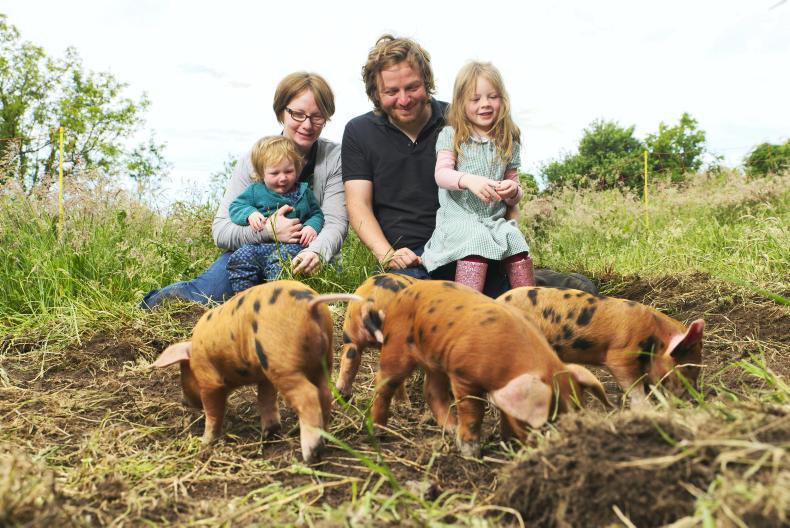

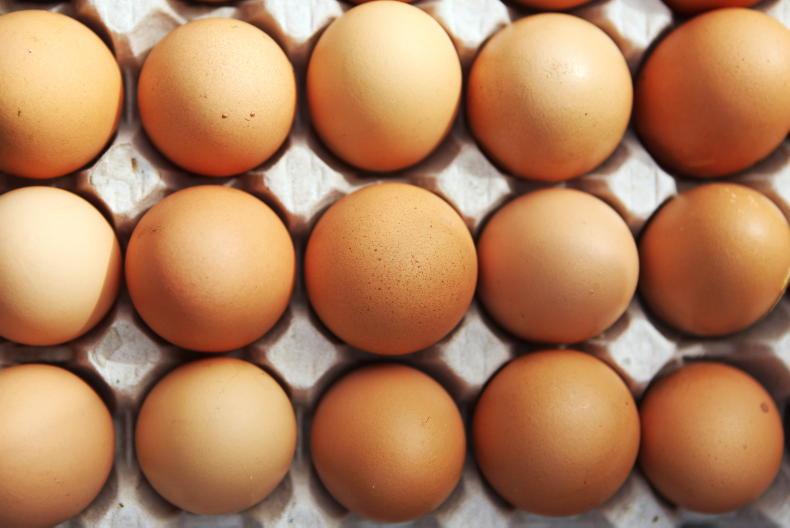
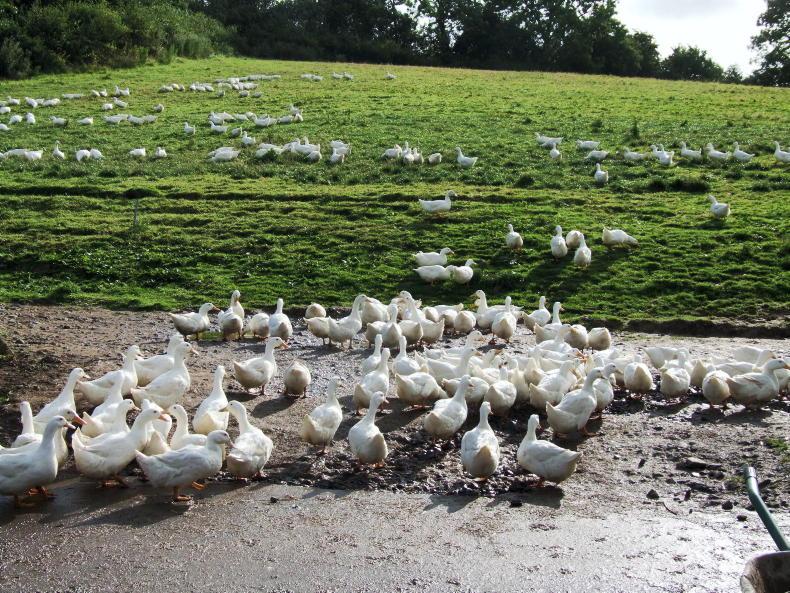
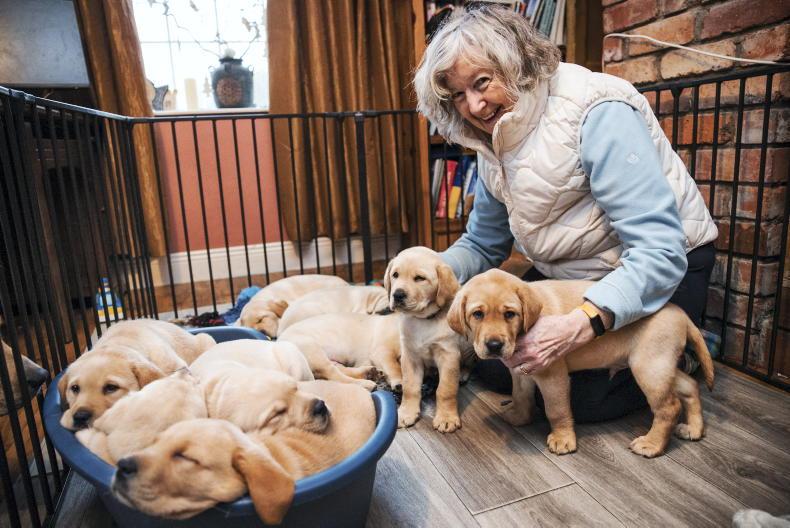
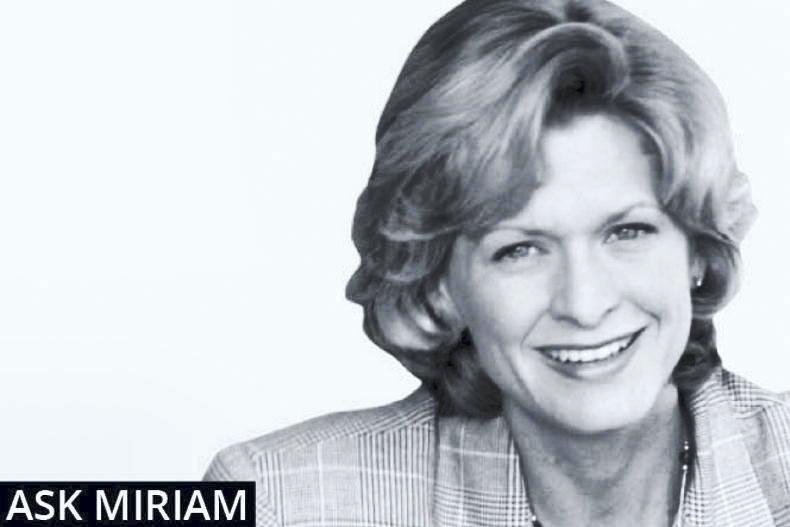
SHARING OPTIONS